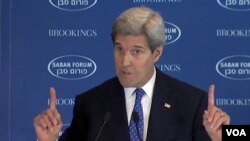Speaking at the Saban Forum in Washington, Secretary of State John Kerry said the focus of U.S. policy in the Middle East is to “help ensure that the builders and the healers throughout the region have the chance that they need to accomplish their tasks.”
Among key issues, Mr. Kerry pointed to progress being made toward a political solution to the Syrian war which, if successful, would make possible a stronger and more unified assault on Daesh and other violent extremists. He also highlighted the critical need for Israeli and Palestinian leaders to break the current impasse, and focus on working through the difficulties hindering the only viable option for peace between the Israeli and Palestinian peoples: a two state solution that can afford security and prosperity for both. The United States, said Mr. Kerry, “will be with them every step of the way … to support them in that effort.”
Additionally, for the builders in the region to have the opportunity to succeed, it is imperative, Secretary Kerry said, that they “be shielded as much as possible from the sources of imminent and potential danger.”
That is why the nuclear deal agreed to by the European Union, the P5+1 countries and Iran is so important.
Two years ago, when formal negotiations with Iran began, Iran had 19,000 centrifuges; it had a stockpile of enriched uranium; and it was building a heavy water reactor able to produce enough weapons grade plutonium for a bomb. If it chose to, Secretary Kerry said, Iran could obtain all of the fissile material needed for a nuclear weapon in as little as two months:
“Under the Joint Comprehensive Plan of Action, every single one of Iran’s pathways to a bomb is blocked -- it’s uranium pathway, its plutonium pathway, its covert pathway. ... And because of the unprecedented monitoring and verification requirements that we negotiated, which are an integral part of this plan, we now have 25 years of day-to-day, complete visibility to every ounce of uranium that is mined. ... We track it.”
Secretary Kerry said the nuclear deal with Iran was considered on its own terms, not as part of speculation that Iran would make a shift in its destructive behavior in other areas.
“It was the right thing to do,” he said, “because any effort to roll back Iran’s behavior is…a lot easier if they don’t have a nuclear weapon.”

















